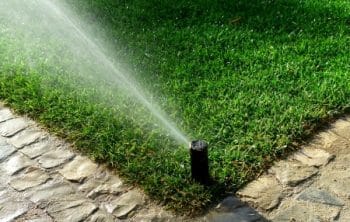
Understanding the hydration needs of your North Texas lawns will ensure success in maintaining a healthy, verdant bed of grass. A properly watered lawn is able to aggressively compete with weeds and other unwanted plants. Proper lawn watering also lowers the risk of lawn diseases.
The following four lawn watering tips will ensure that your North Texas lawn remains lush and well-hydrated.
Click here to request a free service quote from Lawn Service Fort Worth!
1. Watering to Encourage a Deep Root System
This is a very important step during the hot weather. North Texas lawns typically require about 1 inch of watering per week. St. Bermuda grass, however, sometimes needs up to 1.5 inches. Why does this promote deep root growth? Because watering deeply instead of frequently prompts the grass’s root system to reach further into the soil for moisture, which increases its resiliency against drought.
If you truly prefer watering twice per week, you can simply cut the overall amount in half. But again, a twice-per-week irrigation schedule is less likely to fortify the root system.
For accuracy, you will want to place some sort of gauge within the range of your irrigation system, to measure the amount of water provided. Rain gauges are inexpensive, but you can make a simple gauge to use when watering the lawn.
Simply find an empty container- like a cleaned soup can, and mark the inside at 1 inch depth (or 1.5 inch, respectively). If you place it at the outer perimeters of your lawn, you can check the water level without getting soaked by the sprinklers.
2. More Reasons to Avoid Overwatering
In addition to being generally unnecessary, there are other hazards involved in overwatering your lawn. In doing so, you may cause incidental runoff that can strip your topsoil of nutrients, as well as pesticides and fertilizers that have recently been applied. It’s good to irrigate your lawn shortly after treating it, but the idea is to provide enough moisture to help it soak in.
“Waterlogging” your lawn can also do the opposite. An over-saturated yard can lead to treatments and nutrients soaking further into the ground, below the topsoil where your grass’s root system dwells.
Additionally, excessive moisture can invite all manner of uninvited guests. Some lawn diseases thrive in consistently damp environments, and many insects use standing water as a “nursery” for their eggs.
3. Watering at the Right Time
It is recommended to water your North Texas lawn early in the morning, before 10 a.m. On a warm day, watering from mid-morning to late afternoon will cause one-third of your water to evaporate before it soaks in. This is literally a waste of resources!
Watering in the evening or at night makes your grass somewhat more susceptible to lawn diseases. As mentioned above, many of them propagate in damp areas, and the risk is further increased if said areas are also dark.
If you’re experiencing low water pressure, we suggest you look into these sprinkler heads specially designed to address that circumstance.
4. Observe The Stress Points
A stress point in your lawn is basically an area where that bit of grass is getting excessively more or less sun and/or irrigation. Typically this will be in corners, shady spots, low points,and odd nooks and crannies around your landscaping structures. Keep an eye on these areas for wilting, drying, or discoloration.
Different grass types can show stress in different ways. For instance, the blades Augustine grass may begin to “fold” when ailing. For Bermuda and Zoysia grasses, a good indicator as when a footprint does not “bounce” back.
The main objective in effective lawn care is striking a balance. Everything else we’ve reviewed is great advice for 95% of your lawn. But be mindful of those odd little areas that may need a bit more- or less- TLC when it comes to your irrigation schedule.
Overall, the best strategy for watering lawns is to apply water infrequently, yet thoroughly. This is the way to make a deep, well-rooted lawn that effectively utilizes the water that soaks into the soil.

I recently moved to Perryton (Northern Texas) and I have been having such a hard time getting my lawn to grow and flourish all summer. This is exactly the kind of information I was looking for. I feel like a lot of places are only interested in selling you their lawn care products rather than just giving you expert advice. Thanks so much for this! I will start putting my lawn on a watering schedule.